Search Results
Search
Filter results
Advanced Filters
Your search returned 242 Solutions
-
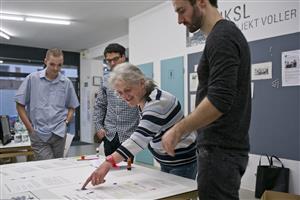
Billing information and customer support in simple language
PIKSL uses the competences of people with and without disabilities to develop products and services for everyone. One of its services helps E.ON, a German utility company, to better communicate with all of its customers. In 2016 approximately 300 people with intellectual disabilities used this service during the pilot phase.
PIKSL - Living in the community gGmbH, Germany -
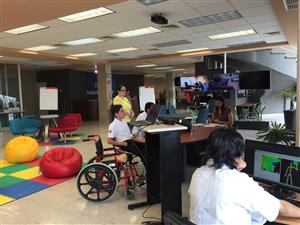
Providing free space to develop technological skills for young people at risk
The Democratizing Innovation in the Americas (DIA) Inclusive Lab provides youth with and without disabilities a free space to learn digital and technical skills and to develop new ideas using adaptive and high-end technologies such as 3D printers, laser cutters, screen readers, and voice recognition programmes.
Trust for the Americas, DIA Inclusive Innovation Lab, Mexico -
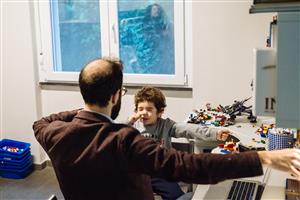
Therapy IT-Platform Improves Motor Function in Young People with Cerebral Palsy
Mirrorable is a home-based therapy programme based on Action Observation Treatment, which states that by observing and imitating the actions of others we trigger specific neurons in our own brain. Young stroke survivors are paired via a video platform and undertake tasks together to improve motor skills.
Fight the Stroke, Mirrorable, Italy -
How to teach students with and without disabilities equally
Groups of Students with and without disabilities are taught together using the same curriculum and beeing subject to the same academic criteria. Students with disabilities are supported by facility adaptation, specialized materials and equipment, counselling, as well as training for teachers and staff.
Technological University of Santa Catarina, Mexico -
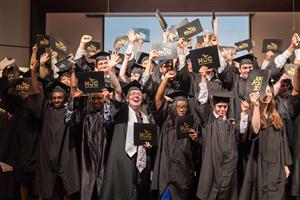
Person-centred transition programme for students to post-school life
The transition programme for students aged 18 to 25 includes vocational certificates and career-readiness credentials. A complementary person-centred support service offers mentoring and tutoring, career counselling, and self-advocacy training. VAST also offers employment and internship placement assistance.
Houston Community College, VAST Academy, United States of America -
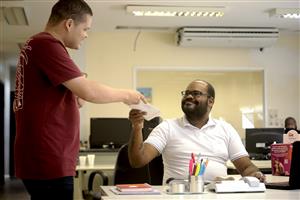
Job clubs as employment entry points for people with intellectual disabilities
To get people with intellectual disabilities into regular jobs, Instituto Jô Clemente uses a model with three key elements: professional guidance (Work Club), employment development, and post-inclusion monitoring. The model has been designed as a low-cost practice and is funded by the participating companies.
Jo Clemente Institute, Professional Inclusion, Brazil -
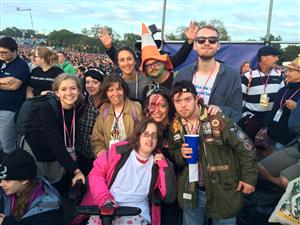
Teaming up persons with learning disabilities or autism for leisure activities
Stay Up Late matches each participant with a volunteer with the aim to develop an ongoing friendship. The matching process takes into account such factors as cultural tastes, gender, age, geography, and whether the individual can access public transportation. By mid of 2017, there were 85 active pairs of "Gig Buddies".
Stay Up Late, Gig Buddies Online Service, Gig Buddies, United Kingdom -
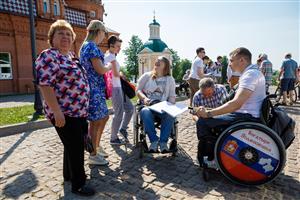
A social franchise model for accessibility experts
In 2015, the All-Russian Society of Disabled People (ARDS) began to conduct accessibility seminars throughout the country. In order to support many of the people it trains, the ARDS set up expert centres across Russia, offering advice and financial support. By 2019, some 480 experts were working in 64 of 85 regions of Russia.
All Russian Society of Disabled People, Certification in Accessibility Expertise, Russia -
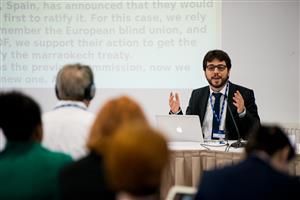
Transatlantic e-Accessibility standards cooperation
In 2004 the United States and the European Union initiated a process to harmonize the standardisation of ICT accessibility requirements. This cooperation resulted in largely compatible standards, that can create enormous leverage for accessible technologies and possibly lay the groundwork for an international standard.
United States Access Board, Mandate 376; European Standard on e-Accessibility EN 301 549 of 2014 of the European Commission, European Union Proposed rule for 508 Standards and the 255 Guidelines of 2015 of the U.S. Access Board, USA, United States of America -
Preparing young people for real jobs in bakeries
Gragger, a bakery in Upper Austria and Caritas have organized "Backma's", a project that provides vocational on-the-job training for adolescents with disabilities. Under the supervision of mentors, the apprentices acquire practical skills in the production of pastries in a full-fledged working bakery in the town of Linz.
Caritas Linz, Austria